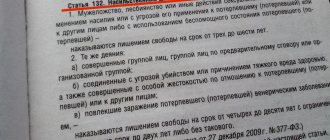Commentary to Art. 334 Criminal Code
1. The objective side of the crime consists of beatings (Article 116 of the Criminal Code) or the use of other violence, which is recognized as causing minor harm to health, restriction of freedom, etc. Such actions are committed against a superior during the performance of his military service duties or in connection with fulfillment of these duties. Thus, the commission of these acts under other circumstances not related to the performance by the chief of his military service duties will entail liability under other articles of the Criminal Code.
2. The act is completed from the moment the violent actions specified in the law are committed.
3. The subject of the crime is a military serviceman subordinate to a superior who has been subjected to violent acts.
Second commentary to Art. 334 of the Criminal Code of the Russian Federation
1. Violent actions qualified by Art. 334, can be committed due to the subordinate’s dissatisfaction with the official activities of the superior that took place in the past, or in connection with his specific actions performed at the moment.
2. Violence against a superior, which is a defense against unlawful actions on the part of the superior himself, excludes the liability of the subordinate under Art. 334 of the Criminal Code (Review of judicial practice of garrison military courts in criminal cases for the 1st half of 2014 // https://ovs.skav.sudrf.ru).
3. Violent actions against a superior, committed in the process of resisting him or forcing him to violate the duties of military service, are covered by Art. 333, such actions committed on the basis of personal relationships not related to the official activities of the boss should be qualified under the relevant articles of Chapter 16 of the Criminal Code.
4. According to Part 1 of Art. 334 qualifies beating a superior, causing minor harm to his health, as well as other violent actions associated with causing physical pain or restricting his freedom.
5. On the concepts of violent actions against a boss: by a group of persons, a group of persons by prior conspiracy and an organized group (clause a" part 2); with the use of weapons (clause “b”, part 2); with the infliction of grave or moderate harm to health or other grave consequences (clause “c”, part 2) see: commentary to Art. 333.
6. The subject of the crime is a military serviceman, by service or military rank, permanently or temporarily subordinate to the person against whom violent actions are committed.
7. The subjective side of the crime - guilt in the form of direct intent
Judicial practice under Article 334 of the Criminal Code of the Russian Federation
Determination of the Judicial Collegium for Criminal Cases of the Supreme Court of the Russian Federation dated December 12, 2019 N 15-UD19-13
12/22/2006 under Part 1 of Art. 334 of the Criminal Code of the Russian Federation, art. of the Criminal Code of the Russian Federation to 1 year of suspended imprisonment with a probationary period of 1 year; 01/24/2008 according to clauses “a”, “g”, part 2 of art. 161 of the Criminal Code of the Russian Federation, Art. of the Criminal Code of the Russian Federation to 2 years 1 month of imprisonment, released on October 20, 2009 after serving the sentence;
Resolution of the Constitutional Court of the Russian Federation dated 04/08/2021 N 11-P
The Code of the Russian Federation on Administrative Offenses in Article 6.1.1 also provides for liability for beatings or committing other violent actions that caused physical pain, but did not entail the consequences specified in Article 115 of the Criminal Code of the Russian Federation, if these actions do not contain a criminal offense, i.e. .e. an act that is an integral part of the objective side of any crime (Articles 131, 156, 161, 213, etc. of the Criminal Code of the Russian Federation) or the main, constituent feature of a crime (Articles 116, 116.1, 117 and 334 of the Criminal Code of the Russian Federation). Accordingly, when qualifying beatings under Article 116.1 of the Criminal Code of the Russian Federation, law enforcement agencies, primarily the courts, focus primarily on the elements of a crime that characterize its subject as a person who, at the time of committing this act, was subject to administrative punishment.
Third commentary to Article 334 of the Criminal Code of the Russian Federation
1. The article provides for liability for violent actions against a superior during the performance of his military service duties or in connection with the performance of these duties. Violent actions are expressed in beatings, causing minor harm to health or committing other violent actions that cause physical pain (see commentary to Articles 115, 116). Violent actions provided for in this article are committed on the basis of dissatisfaction of a subordinate with the official activities of a superior, both at the present moment (during the performance of his military service duties) and in the past (in connection with the performance of these duties). The crime can be committed both on and off duty (for example, beating a squad commander for a penalty imposed upon meeting him on leave).
2. The subjective side of the crime is characterized by direct intent. The motives for violent actions are related to the official activities of the boss. Therefore, violence committed on the basis of personal relationships (personal hostility, jealousy, envy, etc.) should be qualified under the relevant article of Chapter 16 of the Special Part of the Criminal Code.
3. The subject of this crime may be a military serviceman subordinate to the person against whom violent actions are committed.
4. On the concept of qualifying circumstances provided for in Part 2 of this article, see the commentary to Art.
Art. 35, 111, 112, 333 CC. ‹ Article 333. Resistance to a superior or forcing him to violate the duties of military serviceUp Article 335. Violation of the statutory rules of relations between military personnel in the absence of subordination relations between them ›
Article 334 of the Criminal Code of the Russian Federation (“Violent actions against a superior”)
Violent actions against a superior, if they were committed during the performance of his military service duties or in connection with the performance of these duties, but are not associated with resistance or coercion to violate official duties, are qualified under Art. 334 of the Criminal Code of the Russian Federation. Crimes provided for under Art. 333 and Art. 334 of the Criminal Code of the Russian Federation are equally associated with the use of violence against victims, and the distinction between these elements is made not by the nature of the violence used, but by the presence or absence of elements of resistance and coercion in its use.
Violent actions are expressed in beatings or the use of other violence against the boss. Battery is the infliction of two or more blows on the victim, causing physical pain in the absence of harm to health. Under other violence in Part 1 of Art. 334 of the Criminal Code of the Russian Federation is understood as any active physical violence associated with causing pain or minor harm to health (including as a result of a single blow), or with restricting the freedom of the victim. Causing serious or moderate harm to health goes beyond the disposition of Part 1 and is a qualifying feature of paragraph “c” of Part 2 of Art. 334 of the Criminal Code of the Russian Federation.
Violent actions can be committed in connection with the performance by a superior of specific military service duties directly at the moment (for example, beating in response to a reprimand in the service) or in connection with his previous official activities (beating for general demands on subordinates, in revenge for imposing a penalty and etc.), but in any case, the actions of the perpetrator must have a connection specifically with the official activities of the victim. Battering or causing harm to health in the absence of such a connection, including for reasons of personal hostility, domestic conflicts, jealousy, does not constitute this crime and is qualified according to the relevant provisions of Chapter 16 of the Criminal Code of the Russian Federation.
The performance of the duties of military service is understood as the performance by a serviceman or a person equal to him in legal status, within the limits of the powers granted, of an official task determined by a received order, military regulations or other normative legal acts (instructions, manuals, regulations, etc.). In accordance with Art. 37 of the Federal Law “On Military Duty and Military Service”, a military personnel, as well as a citizen undergoing military training, are considered to be performing the duties of military service, in particular, when fulfilling an order received or official duties, participating in combat operations and exercises, performing tasks in armed conflicts, carrying out combat duty (combat service), performing duties as part of daily or garrison duty, being on the territory of a military unit during duty hours, traveling to and from the place of military service, being on a business trip or undergoing treatment, participating in the liquidation of the consequences of natural disasters (catastrophes) , accidents), providing assistance to internal affairs bodies and other law enforcement agencies, protecting life, health, honor and dignity of the individual. The concept of superior and subordinate has already been discussed. It should be added that they cannot be qualified under Art. 334 of the Criminal Code of the Russian Federation those cases when violence on the basis of official activities is committed against a former boss, who is no longer such at the time of the commission of the offense.
Violent actions against the boss, which are a way of resisting him or forcing him to violate official duties, are fully covered by Art. 333 of the Criminal Code of the Russian Federation and in additional qualifications under Art. 334 of the Criminal Code of the Russian Federation are not needed.
Qualifying features of Part 2 of Art. 334 of the Criminal Code of the Russian Federation - the same as in Part 2 of Art. 333 of the Criminal Code of the Russian Federation with the same subject composition of all crimes provided for in Art. 332-334 of the Criminal Code of the Russian Federation. In the case of a group commission of violent acts, if each of the perpetrators is a subordinate of the victim, the actions of all participants in the crime are qualified under paragraph “a” of Part 2 of Art. 334 of the Criminal Code of the Russian Federation. If a serviceman for whom the victim is not a superior took part in the commission of a crime as part of a group, the actions of such a serviceman are subject to qualification according to the same norm, but with reference to Art. 33 of the Criminal Code of the Russian Federation. The actions of civilians as part of a group are qualified according to the rules of Part 4 of Art. 34 of the Criminal Code of the Russian Federation, that is, only as an organizer, instigator or accomplice of this crime. Civilians cannot be co-perpetrators of this crime.
Violent actions of a superior against a subordinate, unlike the previous Criminal Code of the Russian Federation, are no longer classified as crimes against military service and must be qualified under Art. 286 of the Criminal Code of the Russian Federation as abuse of official powers (if this boss is an official).
Chapter 52. Investigation of crimes against military service
Violent actions against not a superior, but a military serviceman who is not in a relationship of subordination with the perpetrator (by position or military rank) are qualified under Art. 335 of the Criminal Code of the Russian Federation.
Article 335 of the Criminal Code of the Russian (“Violation of the rules of statutory relations between military personnel in the absence of subordination relations between them”)
In accordance with Art. 21 of the Russian Constitution, no one should be subjected to violence or degrading treatment, and the dignity of the individual is protected by the state. Therefore, violation of the statutory rules of relations between military personnel in the absence of subordination relations between them is recognized as a crime, which consists of deliberate non-compliance with the requirements of general military regulations that establish mandatory norms for military personnel of relations and communication with each other, and is expressed in various types of violence, bullying, humiliation of honor and dignity, if the perpetrator and the victim are not each other’s superior or subordinate (Article 335 of the Criminal Code of the Russian Federation). Such actions, contrary to constitutional norms and the requirements of Art. 13-14, 16, 64, 155 of the Charter of the Internal Service of the Armed Forces, in their content, encroach on the statutory order of relationships, the moral climate in the military team, the health, honor and dignity of the serviceman.
Violation of the statutory rules of relations between military personnel, as a rule, is accompanied by physical violence against the victim. Violence can be expressed in a single blow, beatings, or any other violent actions related to the infliction of moral suffering, moral damage, physical pain, mild, moderate or severe harm to health on a military personnel. Violence can also be mental - when the perpetrator, through intimidation, threats to commit violent acts against the victim, forces him to fulfill his illegal demands.
The motives for all these actions can be very different. In most cases, they are committed out of hooligan motives and are aimed at achieving a privileged position in the military team, asserting imaginary superiority over the victim, mocking his human dignity, forcing a colleague to provide services of a humiliating nature or perform work in his place. It is possible to violate the statutory rules of relations between military personnel on the basis of national or religious hatred, when the act is accompanied by a conscious humiliation of the national and religious feelings of the victim.
These actions are qualified under Art. 335 of the Criminal Code of the Russian Federation, if they were committed during the performance or in connection with the performance by a military personnel (the perpetrator or the victim) of duties in military service, as well as if they, even without being related to the performance of these duties, were accompanied by a clear disrespect for the military collective, a violation of internal regulations in the unit, disruption of normal sleep, rest and leisure of personnel. The presence of any of the listed characteristics in an act is a prerequisite for qualification under Art. 335 of the Criminal Code of the Russian Federation, and the place where it was committed can be very different. Violation of the statutory rules of relations between military personnel can be committed both directly in the barracks or on the territory of a military unit, and outside it - in the area of exercises, when transporting personnel, at the place of performing economic work, in a medical institution, while on a business trip to composition of the unit, on dismissal, etc.
At the same time, off-duty, personal relationships may arise between military personnel that are not related to the subject of regulation by general military regulations. These can be purely personal relationships during off-duty periods, property or even family relationships (for example, between related or married military personnel). The use of violence against a colleague on the basis of such purely personal hostile relationships (for example, out of jealousy, personal hostility, during a domestic quarrel), without any connection with military service and in the absence of other military personnel, does not encroach on military law and order and therefore does not fall under the characteristics of Art. . 335 of the Criminal Code of the Russian Federation. Such actions are qualified according to the rules of Chapter 16 of the Criminal Code or, depending on the specific circumstances, as hooliganism.
The use of violence or the threat of its use may be accompanied by the confiscation of uniform items, food, cigarettes, small sums of money from a colleague, or coercion to engage in sexual relations in a perverted form. When a violation of the statutory rules of relationships is accompanied by the confiscation of personal property from the victim, the actions are additionally qualified according to the corresponding norm of Chapter 21 of the Criminal Code of the Russian Federation. If uniform items or food products are taken from the ration, then these actions do not require additional qualification, since the specified property is not personal
Chapter 52. Investigation of crimes against military service
property of a serviceman and its seizure is fully covered by Art. 335 of the Criminal Code of the Russian Federation. Violent acts of a sexual nature or forcing the victim to commit such acts go beyond the scope of Art. 335 of the Criminal Code of the Russian Federation and are subject to additional qualifications under Art. 132 or 133 of the Criminal Code of the Russian Federation.
An indispensable condition for qualification under Art. 335 of the Criminal Code of the Russian Federation is the absence of a relationship of subordination between the perpetrator and the victim, that is, they should not be a superior or subordinate in relation to each other, either by position or by military rank. A simple difference in the military ranks of the perpetrator and the victim, which does not yet determine the subordination between them by virtue of Art. 33 of the Charter of the Internal Service of the Armed Forces (for example, private and corporal, sergeant and senior sergeant, lieutenant and captain, etc.), does not prevent the qualification of the act according to the norm in question of the Criminal Code of the Russian Federation. The presence or absence of subordination between specific military personnel is determined in compliance with the statutory rules. For example, a sergeant, in accordance with the aforementioned norm of the Internal Service Charter, is a superior by military rank only for soldiers of the same military unit with him. For the soldiers of the other unit, he is not.
The specific category of military personnel to which the perpetrator and the victim belong does not matter in this regard for qualification - they can be both conscript and contract servicemen, as well as sergeants, warrant officers, officers, but only those who are not in a relationship of subordination to each other according to service.
Subjective composition of Art. 335 of the Criminal Code of the Russian Federation differs from the subjects of crimes provided for in Art. 332-334 of the Criminal Code of the Russian Federation, since the rules of Art. 335 of the Criminal Code of the Russian Federation applies in full not only to military personnel, but also to all other categories of subjects of crimes against military service, defined by Parts 1 and 2 of Art. 331 of the Criminal Code of the Russian Federation - to military builders and reserve citizens during their military training.
The crime in question can only be committed with direct intent. The culprit is aware that by his actions he is violating the order of relationships established by general military regulations, and he wants this. The mental attitude of the perpetrator to the consequences of his actions related to causing harm to the health of the victim can also be expressed in the form of negligence, but this, in accordance with the rules of Art. 27 of the Criminal Code of the Russian Federation does not change the overall intentional nature of the crime.
* According to Part 1 of Art. 335 of the Criminal Code of the Russian Federation qualifies a violation of the statutory rules of relationships associated with the use or threat of use of various types of violence, beatings, causing minor harm to health, and other violent actions associated with causing pain to the victim or restricting his freedom. Causing moderate harm to the victim’s health is the basis for qualifying hazing under paragraph “e” of Part 2 of Art. 335 of the Criminal Code of the Russian Federation, and causing grievous harm to his health is qualified under Part 3 of Art. 335 of the Criminal Code of the Russian Federation, and for such qualification it is sufficient that these consequences occur in relation to at least one of several victims.
Violation of the statutory rules of relationships in relation to two or more military personnel is qualified under paragraph “b” of Part 2 of Art. 335 of the Criminal Code of the Russian Federation, and these actions can be performed simultaneously or at different times. If these actions were committed at different times, but in relation to the same victim, then this is not the basis for such qualification. If criminal acts are repeatedly committed in relation to different victims, both the first criminal episode and subsequent ones are qualified only under paragraph “b” of Part 2 of Art. 335 of the Criminal Code of the Russian Federation, without separately qualifying this episode under Part 1 of the said norm. The concept of committing a crime by a group of persons, a group of persons by prior conspiracy or an organized group is the same as in other crimes against military service. When committed in a group against several military personnel, the act is qualified under paragraphs “b” and “c” of Part 2 of Art. 335 of the Criminal Code of the Russian Federation. If one of the perpetrators was not in a relationship of subordination with the victim, and the other accomplice was a subordinate of the same victim, then the actions of the accomplice are qualified as aiding and abetting in violation of the statutory rules of relationships with additional qualification under the relevant norm of the Criminal Code of the Russian Federation for a crime against the order of subordination.
The grave consequences of hazing (Part 3 of Article 335 of the Criminal Code of the Russian Federation) mean causing the victim grievous harm to health, driving him to suicide, attempted suicide, the victim’s unauthorized abandonment of his place of duty, failure to complete a combat mission, disabling military equipment, major material damage. damage. If present in the act
| signs are also normal. |
Part 2 Art. 335 of the Criminal Code of the Russian Federation, the crime is qualified only under Part 3 of this
A crime should be qualified in a similar way if one of the victims was beaten, another suffered minor harm, and the third suffered serious harm to health. Causing death by negligence is also covered by Part 3 of Art. 335 of the Criminal Code of the Russian Federation and does not require additional qualifications under Art. 109 of the Criminal Code of the Russian Federation.
At the same time, the intentional murder of a serviceman goes beyond the regulation of Part 3 of Art. 335 of the Criminal Code of the Russian Federation and is subject to qualification based on the totality of this norm and Art. 105 of the Criminal Code of the Russian Federation. The same applies to sodomy and other actions of a sexual nature, as well as coercion to commit these actions (Articles 132-133 of the Criminal Code of the Russian Federation).
Violent actions against a superior, if they were committed during the performance of his military service duties or in connection with the performance of these duties, but are not associated with resistance or coercion to violate official duties, are qualified under Art. 334 of the Criminal Code of the Russian Federation. Crimes provided for under Art. 333 and Art. 334 of the Criminal Code of the Russian Federation are equally associated with the use of violence against victims, and the distinction between these elements is made not by the nature of the violence used, but by the presence or absence of elements of resistance and coercion in its use.
Violent actions are expressed in beatings or the use of other violence against the boss. Battery is the infliction of two or more blows on the victim, causing physical pain in the absence of harm to health. Under other violence in Part 1 of Art. 334 of the Criminal Code of the Russian Federation is understood as any active physical violence associated with causing pain or minor harm to health (including as a result of a single blow), or with restricting the freedom of the victim. Causing serious or moderate harm to health goes beyond the disposition of Part 1 and is a qualifying feature of paragraph “c” of Part 2 of Art. 334 of the Criminal Code of the Russian Federation.
Violent actions can be committed in connection with the performance by a superior of specific military service duties directly at the moment (for example, beating in response to a reprimand in the service) or in connection with his previous official activities (beating for general demands on subordinates, in revenge for imposing a penalty and etc.), but in any case, the actions of the perpetrator must have a connection specifically with the official activities of the victim. Battering or causing harm to health in the absence of such a connection, including for reasons of personal hostility, domestic conflicts, jealousy, does not constitute this crime and is qualified according to the relevant provisions of Chapter 16 of the Criminal Code of the Russian Federation.
The performance of the duties of military service is understood as the performance by a serviceman or a person equal to him in legal status, within the limits of the powers granted, of an official task determined by a received order, military regulations or other normative legal acts (instructions, manuals, regulations, etc.). In accordance with Art. 37 of the Federal Law “On Military Duty and Military Service”, a military personnel, as well as a citizen undergoing military training, are considered to be performing the duties of military service, in particular, when fulfilling an order received or official duties, participating in combat operations and exercises, performing tasks in armed conflicts, carrying out combat duty (combat service), performing duties as part of daily or garrison duty, being on the territory of a military unit during duty hours, traveling to and from the place of military service, being on a business trip or undergoing treatment, participating in the liquidation of the consequences of natural disasters (catastrophes) , accidents), providing assistance to internal affairs bodies and other law enforcement agencies, protecting life, health, honor and dignity of the individual. The concept of superior and subordinate has already been discussed. It should be added that they cannot be qualified under Art. 334 of the Criminal Code of the Russian Federation those cases when violence on the basis of official activities is committed against a former boss, who is no longer such at the time of the commission of the offense.
Violent actions against the boss, which are a way of resisting him or forcing him to violate official duties, are fully covered by Art. 333 of the Criminal Code of the Russian Federation and in additional qualifications under Art. 334 of the Criminal Code of the Russian Federation are not needed.
Qualifying features of Part 2 of Art. 334 of the Criminal Code of the Russian Federation - the same as in Part 2 of Art. 333 of the Criminal Code of the Russian Federation with the same subject composition of all crimes provided for in Art. 332-334 of the Criminal Code of the Russian Federation. In the case of a group commission of violent acts, if each of the perpetrators is a subordinate of the victim, the actions of all participants in the crime are qualified under paragraph “a” of Part 2 of Art. 334 of the Criminal Code of the Russian Federation. If a serviceman for whom the victim is not a superior took part in the commission of a crime as part of a group, the actions of such a serviceman are subject to qualification according to the same norm, but with reference to Art. 33 of the Criminal Code of the Russian Federation. The actions of civilians as part of a group are qualified according to the rules of Part 4 of Art. 34 of the Criminal Code of the Russian Federation, that is, only as an organizer, instigator or accomplice of this crime. Civilians cannot be co-perpetrators of this crime.
Violent actions of a superior against a subordinate, unlike the previous Criminal Code of the Russian Federation, are no longer classified as crimes against military service and must be qualified under Art. 286 of the Criminal Code of the Russian Federation as abuse of official powers (if this boss is an official).
Chapter 52. Investigation of crimes against military service
Violent actions against not a superior, but a military serviceman who is not in a relationship of subordination with the perpetrator (by position or military rank) are qualified under Art. 335 of the Criminal Code of the Russian Federation.
Article 335 of the Criminal Code of the Russian (“Violation of the rules of statutory relations between military personnel in the absence of subordination relations between them”)
In accordance with Art. 21 of the Russian Constitution, no one should be subjected to violence or degrading treatment, and the dignity of the individual is protected by the state. Therefore, violation of the statutory rules of relations between military personnel in the absence of subordination relations between them is recognized as a crime, which consists of deliberate non-compliance with the requirements of general military regulations that establish mandatory norms for military personnel of relations and communication with each other, and is expressed in various types of violence, bullying, humiliation of honor and dignity, if the perpetrator and the victim are not each other’s superior or subordinate (Article 335 of the Criminal Code of the Russian Federation). Such actions, contrary to constitutional norms and the requirements of Art. 13-14, 16, 64, 155 of the Charter of the Internal Service of the Armed Forces, in their content, encroach on the statutory order of relationships, the moral climate in the military team, the health, honor and dignity of the serviceman.
Violation of the statutory rules of relations between military personnel, as a rule, is accompanied by physical violence against the victim. Violence can be expressed in a single blow, beatings, or any other violent actions related to the infliction of moral suffering, moral damage, physical pain, mild, moderate or severe harm to health on a military personnel. Violence can also be mental - when the perpetrator, through intimidation, threats to commit violent acts against the victim, forces him to fulfill his illegal demands.
The motives for all these actions can be very different. In most cases, they are committed out of hooligan motives and are aimed at achieving a privileged position in the military team, asserting imaginary superiority over the victim, mocking his human dignity, forcing a colleague to provide services of a humiliating nature or perform work in his place. It is possible to violate the statutory rules of relations between military personnel on the basis of national or religious hatred, when the act is accompanied by a conscious humiliation of the national and religious feelings of the victim.
These actions are qualified under Art. 335 of the Criminal Code of the Russian Federation, if they were committed during the performance or in connection with the performance by a military personnel (the perpetrator or the victim) of duties in military service, as well as if they, even without being related to the performance of these duties, were accompanied by a clear disrespect for the military collective, a violation of internal regulations in the unit, disruption of normal sleep, rest and leisure of personnel. The presence of any of the listed characteristics in an act is a prerequisite for qualification under Art. 335 of the Criminal Code of the Russian Federation, and the place where it was committed can be very different. Violation of the statutory rules of relations between military personnel can be committed both directly in the barracks or on the territory of a military unit, and outside it - in the area of exercises, when transporting personnel, at the place of performing economic work, in a medical institution, while on a business trip to composition of the unit, on dismissal, etc.
At the same time, off-duty, personal relationships may arise between military personnel that are not related to the subject of regulation by general military regulations. These can be purely personal relationships during off-duty periods, property or even family relationships (for example, between related or married military personnel). The use of violence against a colleague on the basis of such purely personal hostile relationships (for example, out of jealousy, personal hostility, during a domestic quarrel), without any connection with military service and in the absence of other military personnel, does not encroach on military law and order and therefore does not fall under the characteristics of Art. . 335 of the Criminal Code of the Russian Federation. Such actions are qualified according to the rules of Chapter 16 of the Criminal Code or, depending on the specific circumstances, as hooliganism.
The use of violence or the threat of its use may be accompanied by the confiscation of uniform items, food, cigarettes, small sums of money from a colleague, or coercion to engage in sexual relations in a perverted form. When a violation of the statutory rules of relationships is accompanied by the confiscation of personal property from the victim, the actions are additionally qualified according to the corresponding norm of Chapter 21 of the Criminal Code of the Russian Federation. If uniform items or food products are taken from the ration, then these actions do not require additional qualification, since the specified property is not personal
Chapter 52. Investigation of crimes against military service
property of a serviceman and its seizure is fully covered by Art. 335 of the Criminal Code of the Russian Federation. Violent acts of a sexual nature or forcing the victim to commit such acts go beyond the scope of Art. 335 of the Criminal Code of the Russian Federation and are subject to additional qualifications under Art. 132 or 133 of the Criminal Code of the Russian Federation.
An indispensable condition for qualification under Art. 335 of the Criminal Code of the Russian Federation is the absence of a relationship of subordination between the perpetrator and the victim, that is, they should not be a superior or subordinate in relation to each other, either by position or by military rank. A simple difference in the military ranks of the perpetrator and the victim, which does not yet determine the subordination between them by virtue of Art. 33 of the Charter of the Internal Service of the Armed Forces (for example, private and corporal, sergeant and senior sergeant, lieutenant and captain, etc.), does not prevent the qualification of the act according to the norm in question of the Criminal Code of the Russian Federation. The presence or absence of subordination between specific military personnel is determined in compliance with the statutory rules. For example, a sergeant, in accordance with the aforementioned norm of the Internal Service Charter, is a superior by military rank only for soldiers of the same military unit with him. For the soldiers of the other unit, he is not.
The specific category of military personnel to which the perpetrator and the victim belong does not matter in this regard for qualification - they can be both conscript and contract servicemen, as well as sergeants, warrant officers, officers, but only those who are not in a relationship of subordination to each other according to service.
Subjective composition of Art. 335 of the Criminal Code of the Russian Federation differs from the subjects of crimes provided for in Art. 332-334 of the Criminal Code of the Russian Federation, since the rules of Art. 335 of the Criminal Code of the Russian Federation applies in full not only to military personnel, but also to all other categories of subjects of crimes against military service, defined by Parts 1 and 2 of Art. 331 of the Criminal Code of the Russian Federation - to military builders and reserve citizens during their military training.
The crime in question can only be committed with direct intent. The culprit is aware that by his actions he is violating the order of relationships established by general military regulations, and he wants this. The mental attitude of the perpetrator to the consequences of his actions related to causing harm to the health of the victim can also be expressed in the form of negligence, but this, in accordance with the rules of Art. 27 of the Criminal Code of the Russian Federation does not change the overall intentional nature of the crime.
* According to Part 1 of Art. 335 of the Criminal Code of the Russian Federation qualifies a violation of the statutory rules of relationships associated with the use or threat of use of various types of violence, beatings, causing minor harm to health, and other violent actions associated with causing pain to the victim or restricting his freedom. Causing moderate harm to the victim’s health is the basis for qualifying hazing under paragraph “e” of Part 2 of Art. 335 of the Criminal Code of the Russian Federation, and causing grievous harm to his health is qualified under Part 3 of Art. 335 of the Criminal Code of the Russian Federation, and for such qualification it is sufficient that these consequences occur in relation to at least one of several victims.
Violation of the statutory rules of relationships in relation to two or more military personnel is qualified under paragraph “b” of Part 2 of Art. 335 of the Criminal Code of the Russian Federation, and these actions can be performed simultaneously or at different times. If these actions were committed at different times, but in relation to the same victim, then this is not the basis for such qualification. If criminal acts are repeatedly committed in relation to different victims, both the first criminal episode and subsequent ones are qualified only under paragraph “b” of Part 2 of Art. 335 of the Criminal Code of the Russian Federation, without separately qualifying this episode under Part 1 of the said norm. The concept of committing a crime by a group of persons, a group of persons by prior conspiracy or an organized group is the same as in other crimes against military service. When committed in a group against several military personnel, the act is qualified under paragraphs “b” and “c” of Part 2 of Art. 335 of the Criminal Code of the Russian Federation. If one of the perpetrators was not in a relationship of subordination with the victim, and the other accomplice was a subordinate of the same victim, then the actions of the accomplice are qualified as aiding and abetting in violation of the statutory rules of relationships with additional qualification under the relevant norm of the Criminal Code of the Russian Federation for a crime against the order of subordination.
The grave consequences of hazing (Part 3 of Article 335 of the Criminal Code of the Russian Federation) mean causing the victim grievous harm to health, driving him to suicide, attempted suicide, the victim’s unauthorized abandonment of his place of duty, failure to complete a combat mission, disabling military equipment, major material damage. damage. If present in the act
| signs are also normal. |
Part 2 Art. 335 of the Criminal Code of the Russian Federation, the crime is qualified only under Part 3 of this
A crime should be qualified in a similar way if one of the victims was beaten, another suffered minor harm, and the third suffered serious harm to health. Causing death by negligence is also covered by Part 3 of Art. 335 of the Criminal Code of the Russian Federation and does not require additional qualifications under Art. 109 of the Criminal Code of the Russian Federation.
At the same time, the intentional murder of a serviceman goes beyond the regulation of Part 3 of Art. 335 of the Criminal Code of the Russian Federation and is subject to qualification based on the totality of this norm and Art. 105 of the Criminal Code of the Russian Federation. The same applies to sodomy and other actions of a sexual nature, as well as coercion to commit these actions (Articles 132-133 of the Criminal Code of the Russian Federation).






